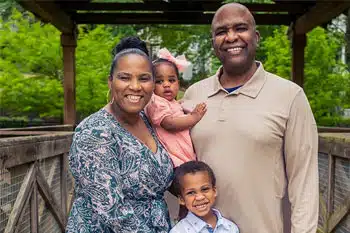
It turns out that openness in adoption can make a big difference, not just in family relationships, but in how adoptees view themselves and their willingness to reach out for help when they need it.
Table of Contents
- Understanding Open Adoption
- Why Mental Health Matters in Adoption
- How Open Conversations Can Help
- Are Adoptees in Open Adoptions More Likely to Go to Therapy?
- What About Birth Parents?
- What About Closed Adoptions?
- The Adoptee’s Role
- Encouraging Mental Health Support for Adoptees
- Sources & Further Reading
Understanding Open Adoption
Open adoption means there’s some level of contact or connection between the adoptive family and the birth family. It can include sharing photos and updates, phone calls, or even in-person visits. It may also include digital connections such as social media and video calls.
But openness isn’t just about contact, it’s also about the level of communication within the adoptive family about adoption. Are questions welcome? Is adoption part of everyday conversations? That kind of emotional openness can be just as important as an adoptee grows up.
Why Mental Health Matters in Adoption
It’s no secret that adoptees can face complex emotions. Even in loving, supportive adoptive families, there can still be feelings of grief, confusion, or loss. Studies have shown that adopted children and teens are more likely than their non-adopted peers to experience emotional challenges like anxiety, depression, or identity struggles. Not every adoptee requires therapy, but mental health support is always a positive, proactive resource.
Unfortunately, in closed adoptions or in families that avoid talking openly about adoption, it can be more difficult for adoptees to feel safe expressing those big feelings. They might worry about hurting their adoptive parents’ feelings or feel like their questions about their birth family are off-limits, especially if little is known about them. These scenarios can lead to silence, self-blame, or shame.
How Open Conversations Can Help
When adoption is talked about openly and honestly from an early age, adoptees grow up knowing that their story is something to be proud of, not hidden or taboo. That openness sets the stage for better mental health in a few important ways:
1. It reduces stigma.
When adoptive parents freely discuss adoption and honor the birth family’s role, it tells the child, “There’s nothing wrong with where you come from.” That message can be incredibly powerful.
Adoptees raised with that kind of openness are more likely to feel secure in their identity, and less likely to see therapy as something shameful. It’s important to note that even if the birth family is unknown or not in any open relationship, adoptive parents can still speak of them respectfully and keep them in prayer.
2. It helps answer identity questions.
Adoptees naturally wonder where they came from. In open adoptions, many of those questions can be answered in real time. They may know who they look like, where their talents come from, or why their birth parents made an adoption plan.
Having those answers can reduce confusion and make it easier for adoptees to understand their full story, even at age-appropriate levels. And when their story makes sense to them, they’re often more confident in who they are.
3. It builds trust and emotional safety.
When adoptive parents are open to questions and emotions, even the hard ones, adoptees are more likely to talk to them when something feels off. That emotional safety makes it more likely they’ll also reach out to a counselor or therapist if they need extra support, even into adulthood. Therapy is often seen as a normal part of caring for their mental and emotional health, not a last resort.
Are Adoptees in Open Adoptions More Likely to Go to Therapy?
There’s no one-size-fits-all answer, but research suggests that adoptees in more open adoption arrangements do tend to have better access to mental health care and may be more open to using it. That’s likely because they’ve grown up in environments where their adoption story is welcomed, not hidden, and where asking for help isn’t seen as a weakness.
In fact, adoptees in general are more likely than non-adopted people to engage with counseling services. That’s not a bad thing. It shows that adoptees are often more in tune with their emotional needs and willing to process their stories with support. In families where adoption is talked about regularly and without shame, that willingness to seek therapy may come even more naturally.
What About Birth Parents?
Open adoption can also be a powerful source of healing for birth parents. Staying connected, even through letters or photos, can help ease feelings of grief and loss. And when the adoption plan is honored and communication is consistent, birth parents may be more likely to access support groups or counseling if they need it. Knowing their child is safe and loved often brings a sense of peace that helps their own emotional healing.
In more open adoptions, where there are also in-person visits and ongoing two-way communication, birth parents often feel included and welcomed in the adoptee’s life. This inclusion, often like extended family, can be very beneficial in navigating these issues as the years go by.
What About Closed Adoptions?
While most birth families today choose open adoption, some adoptions remain closed, either by choice or because of circumstances. Adoptions through foster care, for example, may be closed for safety or legal reasons. International adoptions are also typically closed, simply due to circumstances and lack of knowledge or information.
But even in these cases, adoptees today have more tools than ever to search for answers or make connections. Social media, DNA testing, and online registries have helped many people adopted through closed or international placements find relatives or learn more about their heritage. These digital connections can be emotional and complex—but they can also bring clarity and healing, especially when approached with care and support.
Cultural connections can be valuable too, especially when little is known about the birth parents or how a child came to be in foster care or an international orphanage. Learning as a family about the child’s cultural heritage or country of origin can be a touchpoint that helps the adoptee understand more about who they are, especially when facts are scarce.
The role of adoptive parents remains to keep the conversations surrounding adoption going. It can be easy to assume that because a child doesn’t talk about their adoption that they have no questions about it. Read children’s books from an early age to help normalize adoption conversations so when they get older, they will know it is okay to ask.
The Adoptee’s Role
As adoptees grow, they often take the lead in shaping their own story. Some want more contact with their birth families; others prefer space. Other adoptees are eager to explore cultural connections; others may wait till adulthood. Still others engage in therapy; others take time to identify if it feels needed. The key is that they feel empowered to make those choices without shame or judgement.
At Lifetime, we believe adoptees’ voices matter, whether they’re young children asking questions or adults seeking truth and healing. That’s why we encourage adoptive parents to listen, stay curious, and offer support at every age and stage – even into adulthood.
Encouraging Mental Health Support for Adoptees
Whether an adoption is open, semi-open, or closed, mental health support should always be seen (and available) as a valuable tool. Here are a few ways adoptive families can encourage healthy emotional growth:
• Talk about adoption often, not just once.
• Make therapy a normal topic.
• Find adoption-competent counselors.
• Support identity exploration.
• Let them lead.
Open adoption isn’t a fix-all, but it can be a powerful gift — for adoptees, birth parents, and adoptive families alike. It creates space for truth, connection, and healing. And it often makes it easier for adoptees to access the mental health support they deserve.
At Lifetime, we’ve seen how openness can bring peace, even in the midst of complexity. We believe that when families walk in truth and grace, adoptees are more likely to grow up with the confidence and resilience they need to thrive — emotionally, mentally, and spiritually.
Sources & Further Reading:
• Brodzinsky, D. (1990). A Stress and Coping Model of Adoption Adjustment.
• Von Korff, L. et al. (2006). Openness arrangements and psychological adjustment in adolescent adoptees.
• Verywell Mind. “What Are the Mental Health Effects of Being Adopted?”
• Boston Post Adoption Resources. “Open vs. Closed Adoptions: A Post-Adoption Mental Health Perspective” by Erica Kramer, MSW
• UConn Health Adoption Assistance Program. “Openness in Adoption”
As Vice President of Lifetime Adoption, Heather Featherston holds an MBA and is passionate about working with those facing adoption, pregnancy, and parenting issues. Heather has conducted training for birth parent advocates, spoken to professional groups, and has appeared on television and radio to discuss the multiple aspects of adoption. She has provided one-on-one support to women and hopeful adoptive parents working through adoption decisions.
Since 2002, she has been helping pregnant women and others in crisis to learn more about adoption. Heather also trains and speaks nationwide to pregnancy clinics to effectively meet the needs of women who want to explore adoption for their child. Today, she continues to address the concerns women have about adoption and supports the needs of women who choose adoption for their child.
As a published author of the book Called to Adoption, Featherston loves to see God’s hand at work every day as she helps children and families come together through adoption.





0 Comments